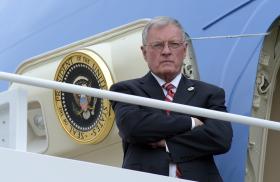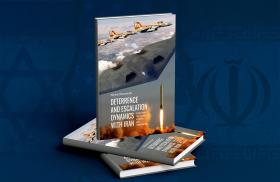- Policy Analysis
- Fikra Forum
Under the Pretext of "Morality": Morality Rhetoric and Freedom of Expression in Iraq
Over the past number of years, many Iraqis have become increasingly concerned about media restrictions imposed by Iraqi authorities, who have banned numerous applications, electronic platforms, and news websites.
These government steps reveal a clear contradiction between its declared goal of digital transformation and the Ministry of Communication’s attempts to narrow Iraqis' public communication. Despite the 2005 Iraqi Constitution guaranteeing freedom of expression and publication, there is no clear legal framework protecting these freedoms, leaving the door open for authorities to use laws as tools to suppress freedom of expression under the pretext of removing degrading content, threats to national security, or insulting the regime and religious symbols. Most recently, Iraqis have discussed the Ministry of Communication’s repeated comments on banning TikTok—one of Iraq’s most popular social media platforms—due to the moral character of its content. However, the targets of morality-based censorship are often the same platforms used by Iraqis to discuss and criticize governance decisions.
Recently, the Minister of Communications reignited a debate on the potential banning of TikTok, a talking point that began over a year ago when Iraqi Minister of Communications Hiyam Al-Yasiri announced her request to the Council of Ministers to block the TikTok application. Then, the minister provided the justification that the application significantly contributes to the disintegration of Iraq's social fabric. Bringing the potential ban back into the public view, Al-Yasiri confirmed on April 5 that stopping the TikTok application depends on a parliamentary decision, and that she had sent a request to the Iraqi Parliament regarding its ban but had not yet received a response to the request. Although it is unlikely that parliament would move forward with such an unpopular decision, this remains the concerning position of the Ministry of Communication.
These demands to close TikTok likewise exist in the United States, but the difference in framing of the proposed bans clearly reflects the distinct priorities and political and social context. For example: closure demands in the United States are based on security concerns, fearing Chinese espionage through the platform, or the possibility of affecting American data, so the discussion is focused on national security rather than the perceived moral content of the app.
In Iraq, the official criticism of the app threatens the closure of a platform that Iraqis widely see as a means of expression and entertainment in a country suffering from increasingly limited free spaces.The Iraqi Ministry of Communications published a statement on its official website on November 29, 2024 that the ministry does not block any site based on moods or personal judgments, but rather to implement what information it officially receives from the concerned state institutions and what is stated in the decision of the Federal Supreme Court decisions, as well as the decision of the Parliament, which includes blocking pornographic sites.
However, the government also has a history of blocking platforms to limit expressions of political dissent. The Iraqi government has previously taken decisions to block platforms such as Facebook, Instagram, and X during the October 2019 protests, which has reinforced suspicions that the attempted closure is related to limiting freedom and access to information. Iraqis now widely rely on TikTok as a main outlet for political expression and news dissemination in light of the increasing restriction of traditional local media.
During the past two decades, a large number of journalists, bloggers, and political activists inside Iraq have been subjected to systematic campaigns of killing, threats, and arrests by known and unknown armed entities due to their journalistic activity or the expression of their opinions in an explicit and bold manner. These threats were effective in forcing many to leave the country in search of a safer environment that guarantees that they can practice their work freely. These efforts have extended over a decade, including a wave of journalists who left in 2015 after they were intimidated and threatened with death as a result of their criticism of some of the ruling political forces or those influential in the country.
In an interview with the author, Haider Hamzouz from the Ansam Foundation for Digital Rights characterized the announcements as the ministry returning to its efforts to block: ”many non-pornographic websites that provide important services to Internet users. These measures that were implemented without clear consultation or providing accurate information about the compelling reasons for them, negatively affected many economic, educational and cultural sectors, which left the Iraqi citizen in a state of frustration and distress." Hamzouz emphasized the widespread impact of such a ban across Iraqi society: “From this standpoint, we emphasize the need to reconsider these measures and the necessity of ensuring freedom of access to information, which is a fundamental right for every citizen in the information age, as internet blocking is a blatant violation of digital human rights."
Investigative journalist and independent researcher Safaa Khalaf likewise emphasized in an interview with the author: "The right to access the internet is constitutionally guaranteed within the freedom of media and expression and the right to access information. Therefore, what the Minister of Communications is doing is a national crime that requires the movement of the public sphere (civil society and organized civil society represented by active non-governmental organizations), as well as the movement of national institutions that guarantee or guard constitutional rights such as the judiciary and the public prosecution. The legislative oversight institution is directly responsible for holding the ministry/minister accountable through the parliamentary oversight and accountability mechanism, and this requires a wide movement to define the danger of restrictive steps such as this step."
Khalaf highlighted the increasing usage of moral concerns to justify limits of free expression in Iraq; guarding the morals of society and public morals "is a pretext that has been rising in light of an attempt to impose a religious agenda on society. As a result, the public sphere must take the initiative to stop promoting behaviors that confiscate freedom of expression. There are enormous risks surrounding these types of authoritarian policies. The regime and groups are trying to copy insulting experiences to the public, such as the Iranian and Syrian experiences, in monitoring the public space and imposing patterns consistent with the state/regime discourse, which often results in a counter-rejection that leads to a popular explosion that ultimately threatens the regime."
Clearly, there are multiple reasons behind the authorities' restriction of individual freedoms in the country, which play the role of monitor and prevent individuals accessing their choice of content or platform. These restrictions increase with the dominance of some parties and their interference in decision-making in order to protect their interests and undermine any criticism directed at them, or any comments that oppose their direction. The ruling authorities specifically fear a recurrence of the popular protests that the country has witnessed over many years, and may increasingly resort to restricting expression through social media to prevent any upcoming protest movements. In past popular protests, social media platforms played a large and effective role in enabling young demonstrators to publish daily news of the demonstrations and expose the repression they were subjected to on a daily basis, despite the authorities cutting off the internet and restricting publishing at that time.
The sharp decline in the popularity of the ruling regime, armed groups, and associated political arms drives the imposition of excessive dominance over the space of expression in all its forms in Iraq. Leaving the space open to the public necessarily means an expected growth in people's expression of their demands and increasing the space for criticizing the regime, dismantling its discourse and narratives, and responding to them—a potentially serious threat to Iraqi political elites. Because any discourse that the regime's groups try to market will be faced with a counter-discourse by the public if access to social media is retained, reducing this access will become increasingly compelling.
Regardless of the ultimate outcome of the ministry of communication’s push against TikTok, Iraqis’ concerns over continuing impositions on freedom of speech highlight the erosion that has already occurred. The Iraqi public is already concerned about monitoring of their online activity, prompting widespread usage of virtual protocol networks (VPN) to avoid monitoring and targeting. Yet these are not failsafe measures, and can expose citizens' data to the risk of misuse. Therefore, the decisions taken by the Iraqi authorities, including the Ministry of Communications that do not preserve both freedom to discuss political issues and preserve data privacy do not serve the interests of Iraqi citizens.
Until Iraqi communication authorities shift away from a focus on “morality” and instead work to enshrine the country’s constitutionally guaranteed freedom of speech, the Iraqi internet will lose spaces for public discourse. Civil society organizations and international organizations have done their party by calling for pressure to reform these policies and to provide the necessary support to Iraqis, who have struggled for years to enjoy freedom and their legitimate right to free and safe access to information, but it remains up to the government to implement these rights and freedoms.



